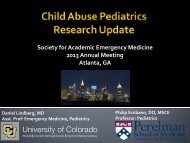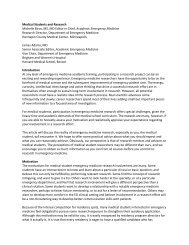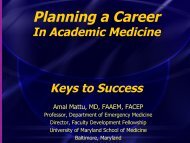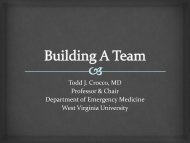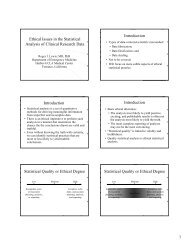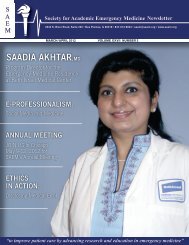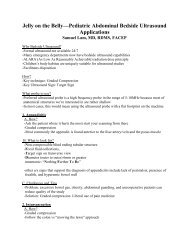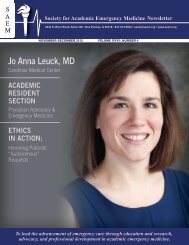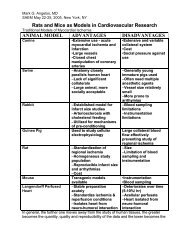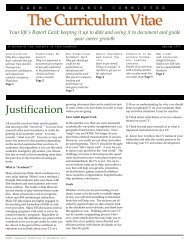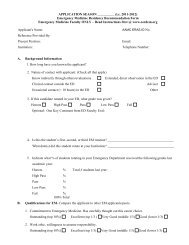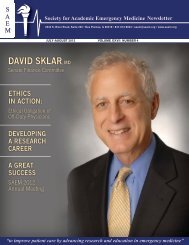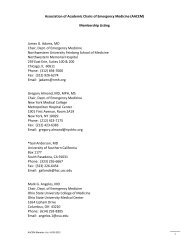Nov-Dec 2011 Newsletter.pdf - The Society for Academic ...
Nov-Dec 2011 Newsletter.pdf - The Society for Academic ...
Nov-Dec 2011 Newsletter.pdf - The Society for Academic ...
Create successful ePaper yourself
Turn your PDF publications into a flip-book with our unique Google optimized e-Paper software.
Executive director’s Message<br />
Proposed 30 Percent Cut to<br />
Graduate Medical Education<br />
<strong>The</strong> Federal Government is faced with<br />
a growing deficit, and the Congressional<br />
Super Committee has been charged with<br />
determining where cuts or automatic<br />
reductions will be enacted. One proposal<br />
cuts graduate medical education (GME)<br />
by thirty percent. With the nation already<br />
facing a significant shortage of residencytrained<br />
emergency physicians, what<br />
effect will a 30-percent reduction have to<br />
James Tarrant, CAE<br />
the nation’s physician-training programs?<br />
<strong>The</strong> American Association of Medical<br />
Colleges (AAMC) reports the cut will <strong>for</strong>ce teaching hospitals to<br />
lay off staff and close training programs.<br />
<strong>The</strong> <strong>Society</strong> <strong>for</strong> <strong>Academic</strong> Emergency Medicine (SAEM) and<br />
the Association of <strong>Academic</strong> Chairs of Emergency Medicine<br />
(AACEM) have joined the American College of Emergency<br />
Physicians (ACEP), the American Academy of Emergency<br />
Medicine (AAEM) and many other emergency medicine groups<br />
in the newly-created Emergency Medicine Action Fund (EMAF).<br />
EMAF will not lobby, but will focus on the regulations proposed<br />
by agencies to implement laws. One of EMAF’s priorities is<br />
advocating against the proposed GME cuts.<br />
<strong>The</strong> AAMC has also reported that:<br />
Because of the concern with likely shortages, the number of<br />
medical schools is increasing, and there will be an additional<br />
7,000 graduates every year over the next decade. Still, there<br />
can be no substantial increase in the number of residency<br />
training positions supported by the federal government.<br />
Congress must lift the freeze on Medicare-supported<br />
residency positions. Because all physicians must complete<br />
three or more years of residency training after they receive<br />
an MD degree, Medicare must continue paying <strong>for</strong> its share<br />
of training costs by supporting at least a 15-percent increase<br />
in GME positions, allowing teaching hospitals to prepare<br />
another 4,000 physicians a year to meet the needs of 2020<br />
and beyond.<br />
A separate AAMC report noted that:<br />
Reducing Medicare GME will worsen the physician shortage<br />
and hurt local economies.<br />
Proposed GME cuts (60 percent/$60 billion by the Simpson-<br />
Bowles Commission; 10 percent/$9 billion by the Obama<br />
Administration; and 20 percent/$20 billion by others) will <strong>for</strong>ce<br />
teaching hospitals to 1) lay off up to 73,000 staff; 2) close<br />
training programs; and 3) eliminate services that operate at a<br />
loss, including those unavailable elsewhere in the community.<br />
GME cuts disproportionately target teaching hospitals, which<br />
comprise only 6 percent of all (5,800) hospitals.<br />
Several times I have encouraged SAEM members to reach<br />
out to your Congressional Representatives. You have two<br />
Senators and a Representative who will be making a decision<br />
on how they will vote on budget cuts. <strong>The</strong>y need to hear from<br />
academic physicians how devastating an effect cuts to GME<br />
funding will have on future access to healthcare. GME cuts<br />
could impact the projected shortage of physicians by 2025,<br />
currently estimated to range from 90,000 to 130,000. This will<br />
continue to coincide with Baby Boomers aging, and their need<br />
<strong>for</strong> care thus increasing patient visits.<br />
Another election year is at hand, and organizations are<br />
already sending messages to our representatives. American<br />
Association of Retired Persons (AARP) commercials remind<br />
Congress that senior citizens earned their Medicare benefits<br />
and that 50 million of them will be voting next year. <strong>Academic</strong><br />
emergency physicians must be heard - in<strong>for</strong>m representatives<br />
of the consequences both to the training programs and the<br />
care provided by our teaching institutions. Find an hour in your<br />
busy schedule and visit your member of Congress in his or her<br />
home district office. Encourage your fellow faculty members,<br />
residents and medical students, no matter what their political<br />
persuasion, to call, write or visit Congressional members. You<br />
can talk both with your personal House member and also the<br />
House member who represents your hospital or medical school<br />
and your patients.<br />
<strong>The</strong> time to take action is now. Call your Senators and<br />
Representatives. Leave them a message with your concerns<br />
and ask if there is a time you could schedule an appointment.<br />
AAMC has background material <strong>for</strong> your call or appointment.<br />
Links are below:<br />
Preserve Medicare Support <strong>for</strong> Physician Training<br />
https://www.aamc.org/download/262676/data/gmefactsheet.<strong>pdf</strong><br />
Physician Shortages to Worsen<br />
Without Increases in Residency Training<br />
https://www.aamc.org/download/150612/data/md-shortage.<strong>pdf</strong><br />
One SAEM member recently expressed an interest in<br />
running <strong>for</strong> Congress. This is a much bigger step in the political<br />
process than talking with Congressional members; however,<br />
more physicians in Congress would bring greater influence to<br />
the issues concerning patient care. Although it is unrealistic<br />
<strong>for</strong> most SAEM members to run <strong>for</strong> Congress, it continues to<br />
be important <strong>for</strong> physicians to talk with members of Congress<br />
to communicate their concerns <strong>for</strong> the quality of patient care,<br />
patient safety and access to care. ◗<br />
5



